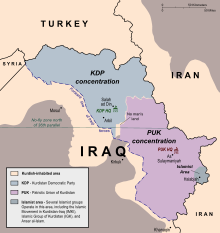
Back الحرب الأهلية في كردستان العراق Arabic کوردوستان ایچ ساواشی AZB شەڕی براکوژی CKB DPK-PUK-Konflikt German جنگ داخلی کردستان عراق Persian Guerre civile kurde irakienne French מלחמת האזרחים הכורדית HE Şerê birakujî Kurdish Guerra Civil no Curdistão Iraquiano Portuguese Гражданская война в Иракском Курдистане Russian
| Iraqi Kurdish Civil War | |||||||
|---|---|---|---|---|---|---|---|
| Part of the Iraqi–Kurdish conflict and the Iraqi no-fly zones conflict | |||||||
 Military situation in Iraqi Kurdistan after the conflict | |||||||
| |||||||
| Belligerents | |||||||
|
Supported by: |
KCP Iraqi National Congress Supported by: | ||||||
| Commanders and leaders | |||||||
|
|
| ||||||
| Strength | |||||||
|
|
INC: 1,000 (1995)[6] | ||||||
| Casualties and losses | |||||||
| 5,000–8,000 killed[10][11] | |||||||
The Iraqi Kurdish Civil War (Kurdish: شەڕی براکوژی, romanized: Şerî birakujî, 'fratricidal war') was a civil war that took place between rival Kurdish factions in Iraqi Kurdistan during the mid-1990s, mostly between the Patriotic Union of Kurdistan and the Kurdistan Democratic Party. Over the course of the conflict, Kurdish factions from Iran and Turkey, as well as Iranian, Iraqi and Turkish forces, were drawn into the fighting, with additional involvement from American forces. Between 35,000 and 40,000 fighters and civilians were killed.[10][11]
- ^ Gunter, Michael M. (1996). "The KDP-PUK Conflict in Northern Iraq" (PDF). Middle East Journal. 50 (2). Middle East Institute: 224–241. JSTOR 4328927.
- ^ Refugees, United Nations High Commissioner for. "Refworld | Chronology for Kurds in Iraq". Refworld.
- ^ a b Willing to face Death: A History of Kurdish Military Forces – the Peshmerga – from the Ottoman Empire to Present-Day Iraq (p. 63) Archived 29 October 2013 at the Wayback Machine, Michael G. Lortz
- ^ "Persian Gulf War and Aftermath – History – Iraq". Countriesquest.com. 15 January 1991. Retrieved 28 January 2013.
- ^ "Iraqi Insurgent Groups". Fox News. 25 March 2015. Retrieved 1 May 2016.
- ^ "Events Leading Up to the 2003 Invasion of Iraq". Archived from the original on 16 November 2018. Retrieved 1 May 2016.
- ^ John Pike. "Kurdistan – Turkey". Retrieved 1 May 2016.
- ^ "Unsafe Haven: Iranian Kurdish Refugees in Iraqi Kurdistan" (PDF). p. 1.
- ^ Gunter, Michael M. (March 1998). "Turkey and Iran Face off in Kurdistan :: Middle East Quarterly". Middle East Quarterly. Meforum.org. Retrieved 28 January 2013.
- ^ a b "Asia Times Online :: Middle East News, Iraq, Iran current affairs". Atimes.com. 20 February 2010. Archived from the original on 22 February 2010. Retrieved 28 January 2013.
{{cite web}}: CS1 maint: unfit URL (link) - ^ a b Mohammed Ahmed, Iraqi Kurds and Nation-building (Basingstoke: Palgrave Macmillan, 2012)[ISBN missing][page needed]